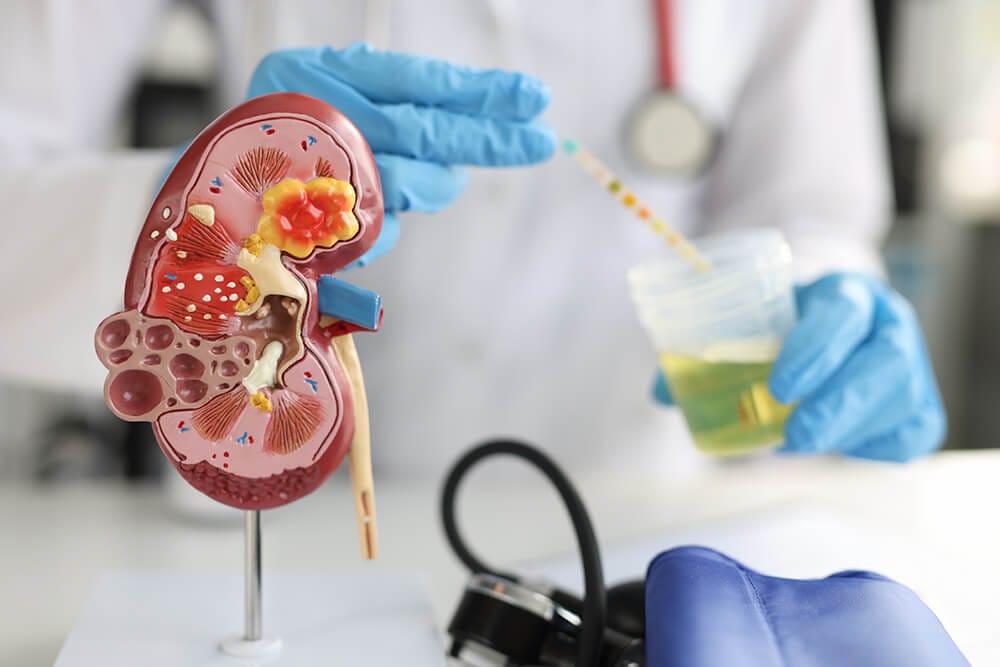
Epithelial Cells in Urine Normal Range: Overview
Epithelial Cells in Urine Normal Range: Overview
Opting for regular checkups is essential once you cross a certain age. But, given the lifestyle we lead and the knowledge of various genetically occurring conditions that can be fatal, many are suggested to go for certain tests on a routine basis. These tests include a complete blood count and a complete urine analysis. The complete urine analysis checks for certain particles and components found in the urine.
There are so many components in our body. Cells, tissues, blood cells, organs, nerve fibers, etc. Various methods protect all these vital components. But all the vital organs, arteries, veins, and other tubes are covered by cells that offer protection and support. One such lining component is the epithelial cells. The epithelial cells in urine normal range are essential as they can help determine if you are suffering from any serious conditions or not.
Definition of Epithelial Cells
Epithelial cells are cells found on both the inside and the outside of the body. The epithelial cells in urine normal range can vary depending on certain factors. These cells are predominantly found externally on the skin and internally in blood vessels; the urinary tract; in the major body cavities; and in organs like lungs, kidneys, and pancreas.
The primary function of these epithelial cells is the creation of a boundary that supports the structure of these organs and provides protection against infections. The other functions performed by these epithelial cells include:
- Aids with sensory detection of taste or smell, or sight as they help transfer signals through their nerve endings.
- Aids with the transportation of filtered material with the help of active-transport systems are found on the plasma’s apical side.
- The ability to utilize the active-transport system enables these epithelial cells the aid in the absorption of filtered material (primarily glucose).
- Some epithelial cells are capable of secreting fluids that aid with other processes like digestion and the excretion of waste products.
Types of Epithelial Cells
In order to know the epithelial cells in urine normal range, it is essential to know more about epithelial cells. There are various types of epithelial cells capable of performing various functions. These cells are differentiated and grouped together on the basis of their structure, shape, and where they are found.
The classifications of epithelial cells, based on their structure, can be categorized as follows:
- Simple Epithelia
- Simple Squamous
- Simple Cuboidal
- Simple Columnar
- Pseudostratified
- Stratified Epithelium
- Keratinized Epithelia
- Transitional Epithelia
When the epithelial cells are grouped together on the basis of their point of origin, there are three types, namely:
- Renal Tubular Epithelial Cells: also known as renal cells, these cells are very important types of epithelial cells. If there is an increased number of cells detected in the urine sample, it can indicate a kidney disorder.
- Squamous Epithelial Cells: These cells are predominantly found in the urethra and the vagina and are the largest among epithelial cells.
- Transitional Epithelial Cells: Also known as bladder cells, these are commonly found in older adults. These cells can be found anywhere throughout the urinary tract system between the male urethra and the renal pelvis.
Symptoms of Elevated Epithelial Cells in Urine
The body undergoes wear and tear every moment. Cells die, and they are removed from the body via the various excretory methods available. One such common outlet is urine. It is possible to determine the normal epithelial cells in urine range, and when a microscopic urinalysis is performed, these values can help determine if you are suffering from any serious conditions or if some other infection is causing those symptoms.
As mentioned above, epithelial cells in urine normal range is possible as cells do die and are removed from the body as waste products. But, elevated levels are of concern. The symptoms that prompt a doctor to prescribe a urine analysis that would check for the presence of epithelial cells in urine are:
- Frequent or urgent need to urinate
- Pain or burning sensation when urinating
- Cloudy or smelly urine
- Blood in urine
- Pain in the lower abdomen
- Feeling tired or unwell
- Itching or soreness in the vagina
- Pain or burning when urinating or having sex
- Thick or clumpy white discharge
- Kidney stones
- A weak immune system
- Diabetes
- High blood pressure
- A family history of kidney disease
- An enlarged prostate
- Bladder cancer
You will notice that some of the symptoms listed above are also conditions that affect a person. But, these conditions can be treated as symptoms of other medical conditions, or they can be a sure indicator of specific disorders in the body.
Test Results for Epithelial Cells in Urine
When testing and checking for epithelial cells in urine normal range, the number of these epithelial cells found does not depend on factors like age or gender or even geographic location. The normal range is between 1 and 5 epithelial cells per high power yield or HPF. Usually, the markers used to denote the number of epithelial cells are either moderate, few, or many. There is no such thing as a negative number of epithelial cells in the urine. Hence, the epithelial cells in urine normal range can be negative or zero.
If you have a moderate count, it could indicate that you might be suffering from:
- Yeast infection
- Urinary tract infection
- Liver disease
- Kidney disease (when the count is higher than 15 epithelial cells per HPF)
- Cancer like bladder cancer
In the case of severe kidney damage, there are no specific treatment plans that can heal the affected organ completely, but certain steps can be observed to keep the condition from aggravating. This is where the count of these cells is too high compared to the epithelial cells in urine normal range. These steps include:
- Having a balanced and healthy diet
- Routinely exercising
- Drinking an adequate amount of water
- Consuming less alcohol
- Quitting cigarette smoking or other substance intakes
- Routinely going for dialysis
While no external factors can affect the number of normal epithelial cells in urine, certain cells that would be additionally present can indicate contamination. For example, if the presence of squamous epithelial cells per HPF is higher than 15 to 20 cells, it does indicate that sample collection was not properly done, and the sample is deemed to be contaminated, and that can not be considered to be tallied against the epithelial cells in urine normal range.
What are the Risk Factors for Increased Epithelial Cells?
There are certain conditions that can affect the number of epithelial cells found in the urine. These conditions are not always very fatal and can be treated with medication. These include:
- Pregnancy
- Frequent UTIs
- Kidney stones
- Diabetes
- High BP or blood pressure
- Weak immune system
Often proper treatment of these underlying conditions can reduce the number of epithelial cells in urine. Doctors can rely on the results of this test as one of the markers that indicate that the treatment is successful. For example, if uncontrolled diabetes causes a high number of epithelial cells in the urine, controlling it via insulation shots and following the care plan for diabetes will reduce the number to a few. When the epithelial cells in urine normal range are attained in a test, you can rest assured that your conditions are being controlled.
Conclusion
The normal epithelial cells in urine are never a cause of concern; hence, epithelial cells in the normal range can be zero. The body sheds dead cells, and these cells are removed from the system. In case of serious conditions like vital organs being affected, you need to consult your doctor immediately. Additionally, people who have been chain smokers or are used to consuming too much alcohol are also advised to get the epithelial cells in urine done as part of their routine urine test. This will help doctors to detect any condition early and take preventive measures to stop the damage and possibly reverse the degeneration.
FAQs
Can cranberry help reduce UTIs?
Constant usage indicates that cranberries can help lower the chances of contracting urinary tract infections. This is due to the presence of certain chemicals in cranberries that prevent the growth of bacteria that causes urinary tract infections.
How to ensure proper collection of urine samples?
If the sample is not collected properly, epithelial cells (squamous)will be found in the urine, leading to the sample being tagged as contaminated. You would be required to provide fresh samples, which can be a headache. To avoid this, you need to:
- Sanitize your hands and dry them properly
- Unscrew the container without touching the inside of the container
- Use cleansing wipes to sanitize your genitals
- Let the first few drops flow and collect from the middle of the urine stream
- Make sure that while urinating in the container, your body does not touch the opening of the container
- Screw the container once required amount is collected
Is it possible to lower high epithelial cells in urine count?
If you are not suffering from any underlying condition but still have a moderate number of epithelial cells in your urine, you can make slight changes to your lifestyle to control the number. These changes include:
- Limiting consumption of food high in cholesterol
- Try to reach your ideal body weight
- Quit smoking
- Decrease daily salt intake
- Increase exercise time

















